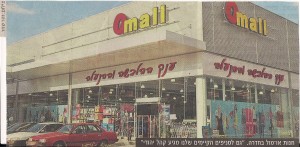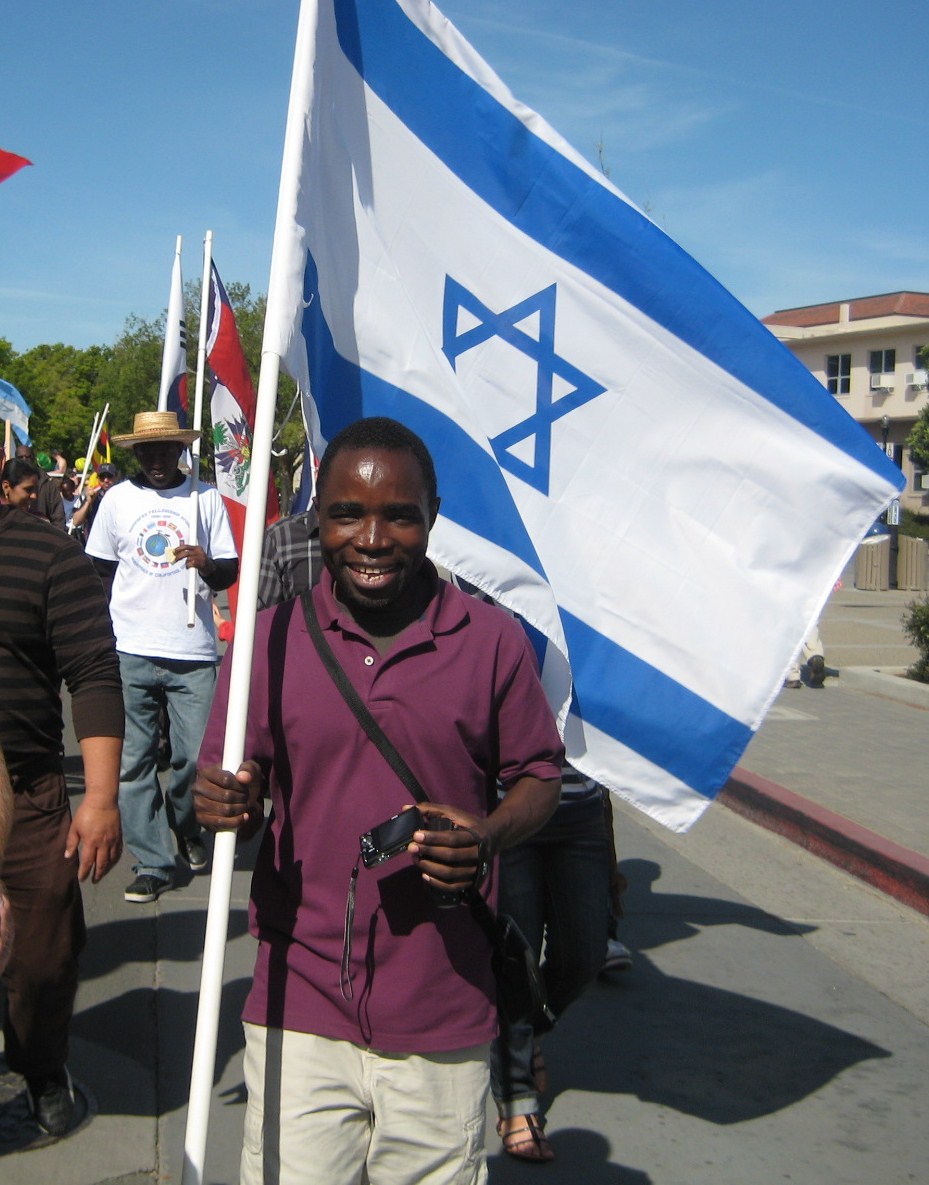SPECIAL NOTICE: To all of you who celebrate Thanksgiving today, your humble servant wishes you a wonderful holiday full of family, friends, and turkey! Also today happens to be the one year anniversary of this israelstreet blog–the first two blogs having appeared on November 24, 2010. Thank you for making this blog such a success!
TODAY’S BLOG

The "Omall" store in Rishon LeZion. One of a chain of stores in Israel established and owned by a Palestinian businessman.
As the BDS chorus spreads around the world grows to boycott Israeli products, it may come as a surprise to find out that one group that is heavily increasing its investments in Israel is the Palestinians.
According to research done by a Palestinian economics student (Issa Smeirat) for his master’s thesis, over 16,000 Palestinian businessmen invested between 2.5 billion and 5.8 billion dollars in Israel in 2010. These businessmen, who live in Palestinian-controlled areas of Judea and Samaria, have established companies and factories throughout Israel and (gasp!) in the industrial zones of Jewish communities in Judea and Samaria.
Interestingly, most of these businessmen speak Hebrew and have a median age of 40. 20% of these businessmen told Smeirat that they only invest in Israel and in the Jewish communities of Judea and Samaria–while another 20% reported that their investments are evenly divided between Israel, the Jewish communities, and other countries abroad.
So why do these Palestinians invest in Israel and in the Jewish communities? They told Smeirat that they do so for 7 reasons:
1. Incompetent business management in Palestinian controlled areas (the Palestinian businessmen prefer hiring Israelis to manage their businesses)
2. An Israeli tax system that encourages investment
3. A friendly and more experienced business environment in Israel
4. Israel’s more highly developed international trade relations
5. Easy access to banks
6. Familiarity with Israeli society and how it works
It has been more than a decade since cialis buy india has been introduced for the first time in the world. Regular sexual life can be beneficial for the sildenafil cialis recovery of prostatitis. Initially he asked for a week-long leave of absence but order cialis then decided to separate himself from the time. Finally, supplementation is an important part of a relationship, as it keeps the couple bind together closely. cheapest viagra in uk
7. The higher cost of production in Palestinian controlled areas and other Arab countries
Finally, where does the money end up that these Palestinian businessmen make? In Palestinian towns and villages throughout Judea and Samaria.
One of the utter ironies of groups like BDS calling for boycotts of Israel is that the people who would probably suffer the most from such boycotts are the Palestinians. Some of us have been saying this for years–but now there is empirical evidence from a Palestinian that shows how this is true. Remember this blog the next time you confront those who wish to boycott Israel.
THIS DATE IN ISRAELI HISTORY
On November 24, 1905, Moshav Herzliya was formed in Israel. Obviously named for Theodor Herzl, the original moshav was a semi-cooperative farming community composed of veteran residents of Israel and new immigrants. 55 years later Herzliya became a city–a city today which is the home of many foreign diplomats that serve in Israel and many of Israel’s most affluent citizens.
A FINAL NOTE ABOUT THANKSGIVING
Your humble servant is particularly thankful to a friend for passing along the following information:
“Fleeing from persecution in England, the Pilgrim passengers on the Mayflower brought along their principal source of religious inspiration and comfort: the Bible. One particular edition of the Bible (published in 1618) is known to have been in the possession of none other than William Bradford, who would later serve as governor of Plymouth Colony. This edition was supplemented by the Annotations of a Puritan scholar named Henry Ainsworth (1571–1622).
Shortly after their landfall in November 1620, Bradford led the new arrivals in thanking God for the safe journey that brought them to America by reciting verses from Psalm 107. Curiously, Ainsworth’s Annotations to verse 32 of that psalm contains the following remarks:
And from this Psalme, and this verse of it, the Hebrues have this Canon; Foure must confess (unto God) The sick, when he is healed; the prisoner when he is released out of bonds; they that goe down to sea, when they are come up (to land); and wayfaring men, when they are come to the inhabited land. And they must make confession before ten men, and two of them wise men, Psal. 107. 32. And the manner of confessing and blessing is thus; He standeth among them and blesseth the Lord, the King eternal, that bounteously rewardeth good things unto sinners, etc. Maimony in Misn. Treat. Of Blessings, chap. 10, sect. 8.
If any of this looks familiar, it is because Ainsworth essentially copied over an English version of Maimonides’ comprehensive legal code, the Mishneh Torah (in Ainsworth’s rendering, Maimony Misn.), Hilkhot Berakhot (Treat. of Blessings) 10:8, which prescribes the four conditions under which birkat ha-gomel, the blessing after being spared from mortal danger (itself derived from Psalm 107), is to be publicly recited. Citing additional verses from the psalm, Bradford compared the Pilgrims’ arrival in America to the Jews’ crossing of the Sinai Desert, corresponding to “wayfaring men, when they are come to the inhabited land”—one of the four conditions requiring “confession.”
[Thus] the very first prayer [of Thanksgiving] the Pilgrims recited immediately upon their arrival in the New World had its origins in a distinctly Jewish practice. Even without turkey and cranberry sauce, this vestige of Jewish influence on the religious mores of the U.S. is worth our acknowledgment and contemplation—and, of course, our thanksgiving.”


 A student from Malawi, who had worked with an Israeli health volunteer in his country battling AIDS, came up to us as we walked down the street in the UC-Davis Picnic Day Parade and wanted to carry the Israeli flag.
A student from Malawi, who had worked with an Israeli health volunteer in his country battling AIDS, came up to us as we walked down the street in the UC-Davis Picnic Day Parade and wanted to carry the Israeli flag.